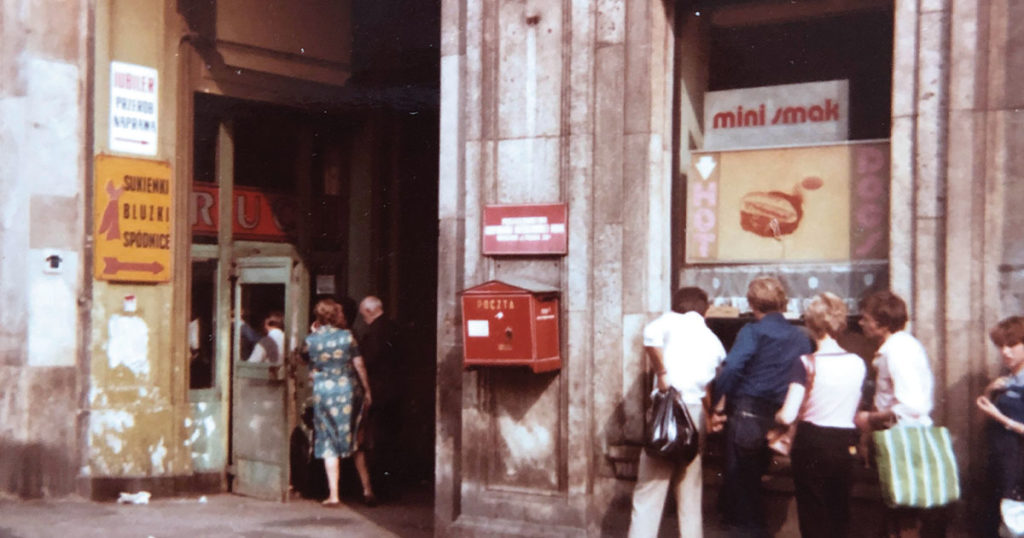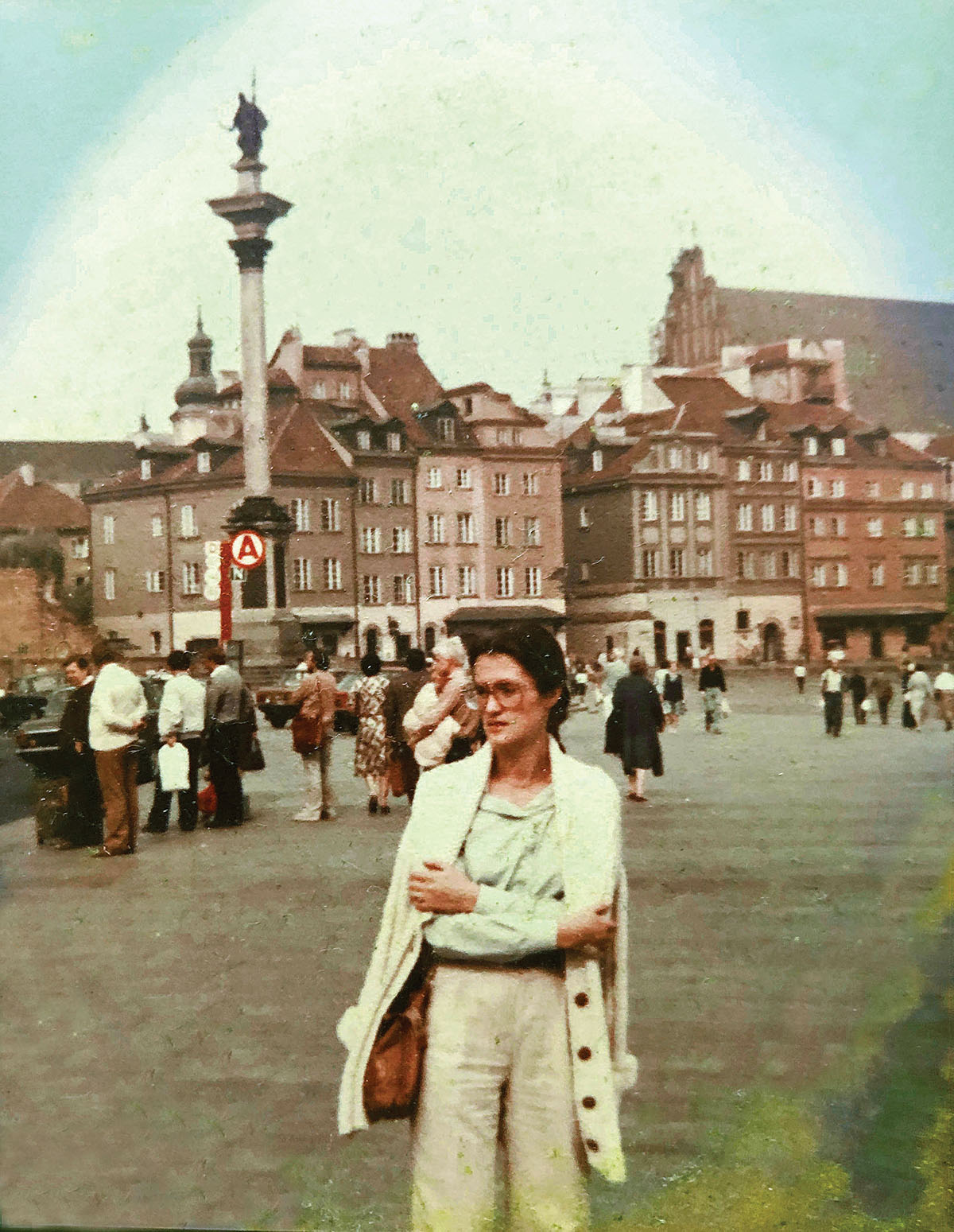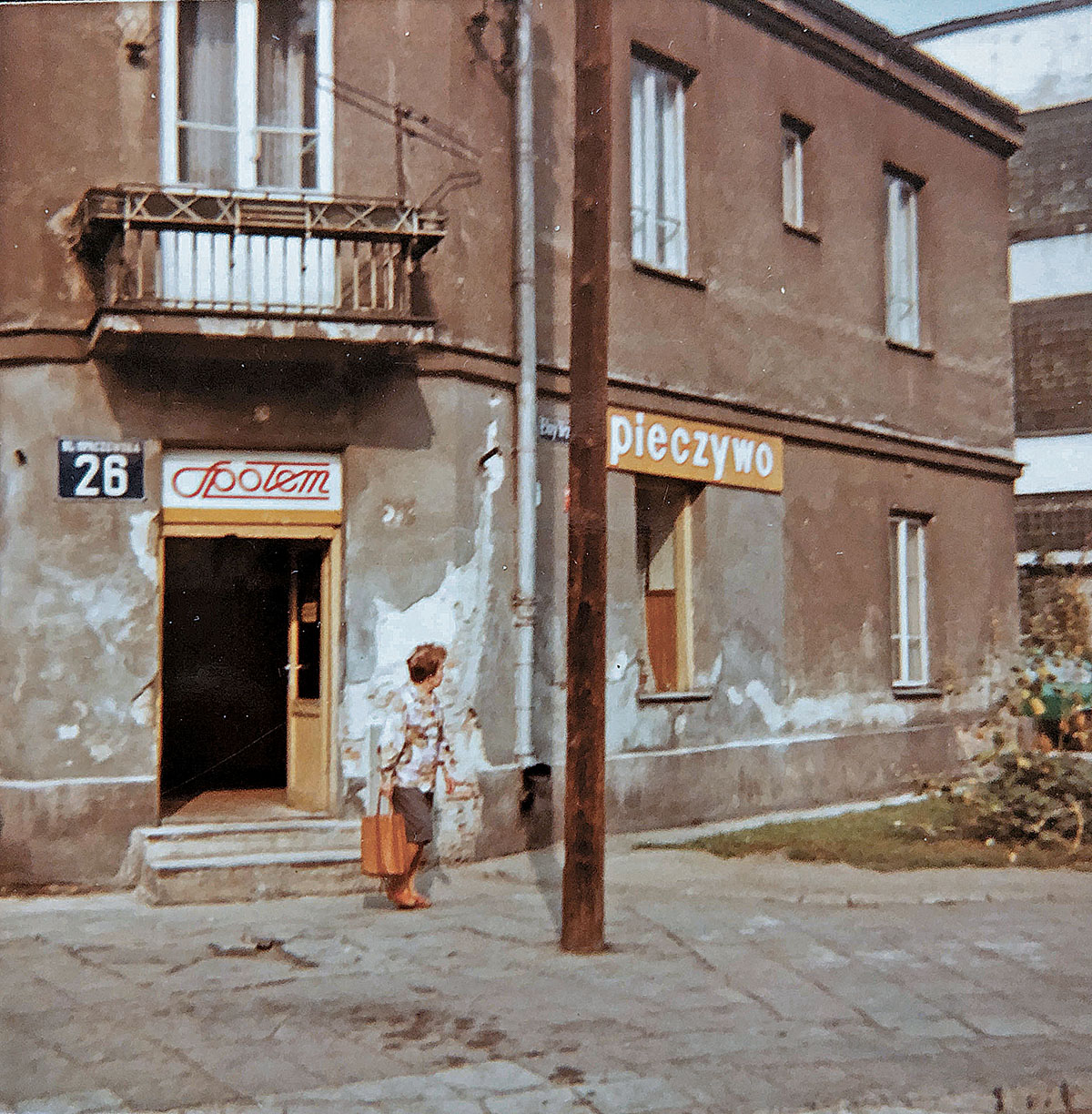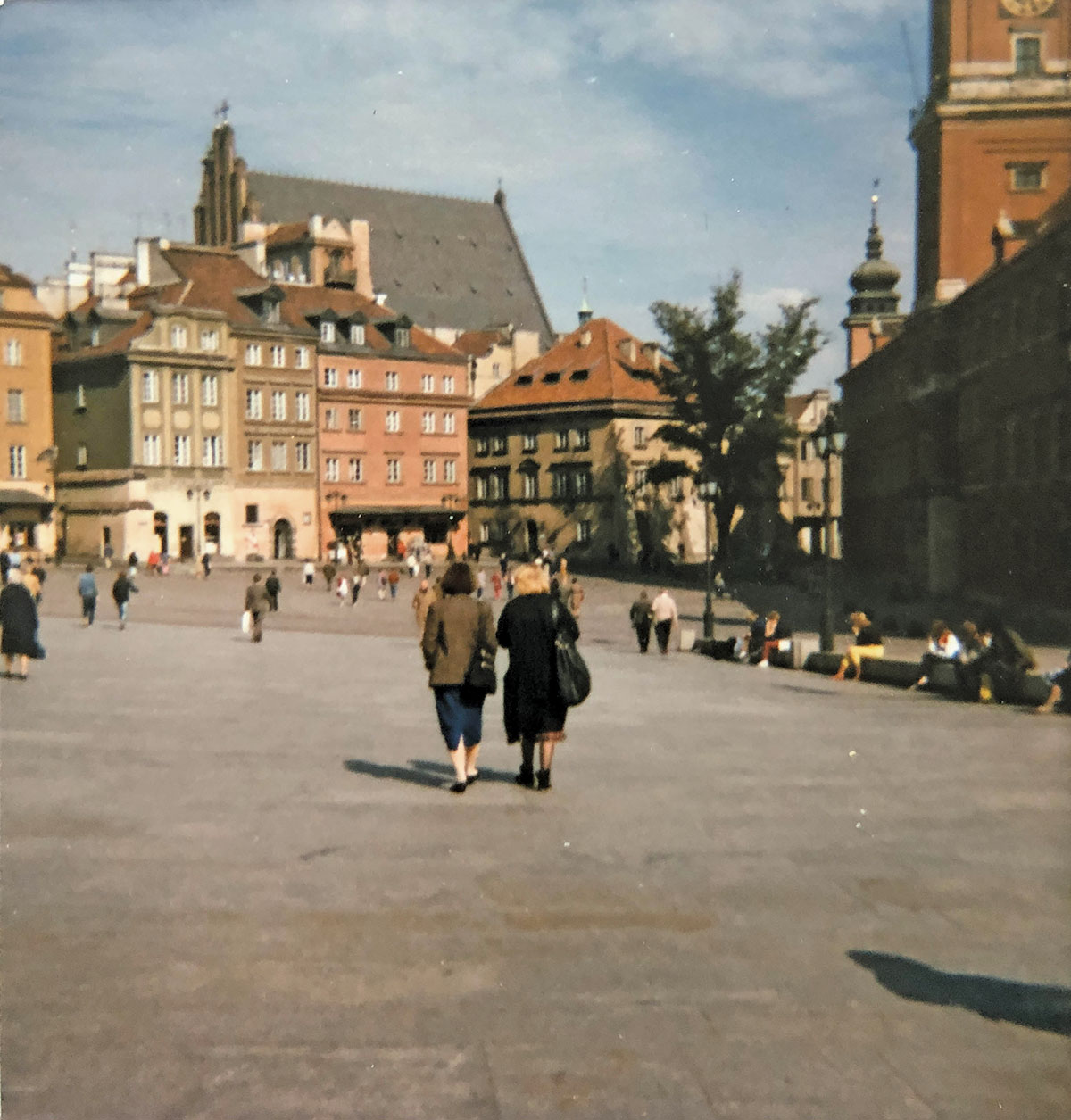Polish Lessons
Four decades ago, a young American found himself in Warsaw during turbulent, extraordinary times

I arrived in Warsaw on a wet September evening in 1980. The landscape was familiar—I had spent six gloomy months in the capital two years earlier—but the situation was new. Hania, sitting next to me in the taxi, looked tired and anxious. I hoped it was not because of our upcoming wedding.
My introduction to Poland had not been successful. I had gone there to be with Hania, whom I had met in London, and who had taken a year off from her studies at the University of Warsaw to come see me in Trenton, New Jersey. An added enticement, for a newspaper feature writer who wanted to be a travel writer, was the prospect of living for a while behind the Iron Curtain. I got a job teaching English and found everything a struggle: the language, the weather, the life drained of amplitude. Still, when my visa was about to expire, I applied for an extension (the power of love) and was asked to become an informer. I declined and, three days later, boarded a train headed out of the country.
That someone with my history had received a visa again seemed to suggest that things were changing. In August, the Gdansk shipyards had given birth to Solidarity, with its electrician-leader Lech Wałęsa, and Poland, in a good way for once, was landing on the world’s front pages.
Hania’s new apartment was in the district of Ochota, not far from the airport. She shared it with her aunt Marylka, who greeted me warmly, and her cousin Elżbieta, who showed restraint. Elżbieta was shy, and keenly aware that there would now be even more competition for the bathroom.
The next day, I maneuvered my umbrella along Opaczewska, a street immortalized in a poem by a Home Army soldier named Jan Janiczek. It led to the spot on Grójecka Street where a group of soldiers and valiant citizens had tried to stop the advancing German army in the fall of 1939. There was a corner bakery, a dim cavity with a worn wooden counter and football-shaped loaves. There was a tiny grocery, across an unkempt park, where cheerless women in dirty aprons shoveled your potatoes off a soil-darkened floor. Closer to the intersection was a string of small shops fronting minimalist window displays. There was no street life—just preternaturally focused shoppers—and there was no complaining, not when you stood in the rain waiting for a tram in the place where brave citizens had died in defense of their country.
At the English Language College on Plac Zbawiciela, I found most of my colleagues from two years earlier. They were welcoming and energized, filling the teachers’ room with intense discussions that veered invariably into Polish. Even the classrooms—where political talk was forbidden—had a crisp, reawakened air.
Within weeks, the school had its own Solidarity chapter. I told Hania of my plan to join, and she immediately vetoed it. If the free trade union were crushed, she said, I would be deported, or worse. She had the innate caution of a child of prison; in the early ’50s, her mother had been incarcerated, while pregnant, for activities against the state.
I put my energies into the safer but equally idealistic activity of learning Polish. Instead of fighting it, as I had before, I decided to embrace it—which is the only way to learn another language. Now, rather than moan about the grammar, I tried to savor the idea that you walked to the biblioteki and then read quietly in the bibliotece.
On a drizzly Saturday morning in October, Hania and I were married at the Palace of Weddings in the Old Town. That evening, during dinner at the Cristal Budapest, Elżbieta’s boyfriend, Jaś, paid the violinists serenading us to move to another table.
My life became one of teaching and studying, strikes and standoffs, worsening shortages and reports of police actions. At school in the new year, we received monthly ration cards for meat, rice, sugar, and butter. A rare letter arrived from my father, urging me to return home with Hania; he could not stop thinking, he wrote, of September 1, 1939. At least the weather, while dreary, was not apocalyptic. It didn’t need to be, given that everything else had become so dramatic. My walks home in the evening along Opaczewska were still dispiriting—I cursed the cold and the closed-up shops, a city deadened by the system as much as by the season—though I never had to worry about muggers.
My progress with Polish quickly surpassed that of my students with English, and I occasionally resorted to it in class. (Translation is easier than explanation.) Demonstrating that I knew the Polish word or phrase for something—the first baby steps in the long journey to fluency—was definitely a way of showing off. But it also sent a message to my students that I was someone interested in their country and culture, which was the same as saying I was on their side. (Language is never more political than in oppressed lands.) I had come to their city not just to teach my language but to learn theirs, as well.
On weekends, no matter the weather, Jaś would propose a walk in the woods. My vote was always for a stroll in the Old Town. He craved nature, quiet, a place free of socialism; I wanted buildings, crowds, the hope of chance encounters. Sometimes I won, and as we walked down streets lined with churches and palaces, I thought of friends back home driving past billboards and used-car lots. It gave me a feeling of privilege almost equal to that of being an eyewitness. The Old Town, rebuilt after its destruction during World War II, contained all the features that would appeal to an American Europhile: cobblestone streets, arched doorways, horse-drawn carriages, which seemed less decorative in a city where one saw the occasional horse-drawn wagon.
Rain would often send us into a café stocked with cakes (so that’s where all the sugar is going!) and filled with smoke. The four of us—Elżbieta, Jaś, Hania, and I—were part of the small segment of the population not addicted to nicotine. Hania’s aunt Bocia, who visited us regularly, knew to bring her own cigarettes, which she stuck with shaking fingers into an ancient yellowed holder. At school there were two teachers’ rooms, one for smokers, one for non, and you had to pass through the first to get to the second, inhaling a cloud of secondhand smoke. Of course, nobody called it secondhand—it was too ubiquitous, like an essential element—and nobody mentioned its potential dangers, not in a country that had seen, and might soon see again, wars, invasions, occupations, insurrections. What was a little smoke after the devastations of the past 200 years?
So we’d sip our tea in the thick haze and then walk out into the damp with hair, sweaters, and coats all smelling like they belonged to a three-pack-a-day smoker.

The author moved to Warsaw to be with his future wife, Hania, shown here at the entrance to the city’s Old Town.
On May 13, 1981, Pope John Paul II was shot. As he recovered, the archbishop of Warsaw, Cardinal Wyszyński, died. The government declared three days of national mourning.
Schools remained open, and many students came, despite having multiple reasons not to: political activism, emotional burnout, survival fatigue. After class one evening, a freshman at the university told me she had a kac moralny (moral hangover). A few weeks earlier, a high school student had announced that she would miss the next class because she would be attending a mass on the death anniversary of Józef Piłsudski, the father of the Second Polish Republic.
There was a growing disconnect between the rote optimism of Western observers and the beaten-down psyches of the observed. I would sit in the American embassy library, reading eloquent editorials on the admirable triumph of the Poles, and then walk outside past crowds of the “triumphant” waiting for their exit visas.
I gave the final exams. No beleaguered students asked for exemptions; instead, on the last day, they brought me flowers.
Returning in September after vacation in the West, we found that ration cards had been extended to include vodka and cigarettes. Życie Warszawy reported that Pravda had called the recent Solidarity Congress in Gdańsk an “anti-socialist bacchanalia.” The Herald Tribune translated the Soviet paper’s description as “anti-socialist orgy.” In the Soviet bloc, all kinds of things were in short supply, but vocabulary wasn’t one of them.
And could there have been a sudden surplus of telephones? We finally got one installed at home.
At school, my students appeared happy to be back. I could now go through the attendance sheets fairly fluently, taking great pleasure in the female names. Agnieszka. Danuta. Grażyna. Jolanta. Katarzyna. Magdalena. Urszula. Zofia. Women’s last names that would have ended with ski in the States here closed with ska—a double note of femininity that seemed appropriate. How could Jolanta Jankowska be anything but lovely? Especially when you pronounced the j as a y and the w as a v?
At home I started reading Polish writers ze słownikiem (with a dictionary). Two who appealed to me were Antoni Słonimski and Julian Tuwim. They had been leading figures in the literary group Skamander, founded shortly after World War I, in the newly independent Poland, with the goal of making Polish poetry less nationalistic and lofty. Which explains my attraction; they didn’t depend on historical allusions to the extent that their predecessors had (making it easier for foreigners to follow along), and they didn’t employ as frustratingly ornate a style. Unfortunately, poetry was out of my reach, especially Tuwim’s beautifully titled Kwiaty Polskie (Polish Flowers), its second line containing the exquisite bottom feeder wzwyż (meaning, appropriately, “upward”). But Słonimski was also an essayist, a humanist somewhat in the style of E. B. White. I sometimes thought of the Skamander group as a Polish version of the Algonquin Round Table, complete with the drinking and the one-liners, but in a world that was far more fraught.
Słonimski and Tuwim were assimilated Jews who had entered the Polish canon. There was almost no talk of Jews now; everyone was focused on Solidarity, some of whose most brilliant strategists—Adam Michnik, Bronisław Geremek—were Jewish. But, as Lawrence Weschler pointed out in one of his New Yorker articles, they were Jewish Poles, not Polish Jews. And Poles were united, at least superficially, for the time being, against the enemy. I didn’t hear an anti-Semitic remark in the two and a half years I lived in Poland; it was mainly after 1989 that the old benighted ugliness resurfaced. Experiencing Poland in the early ’80s, I saw Poles, in so many ways, at their best. Solidarity was not just a free trade union that had evolved into a political movement, it was also a societal ideal.
As the relationship between Solidarity and the government became more strained, rumors of a Soviet invasion increased. Strikes grew in frequency, and food lines lengthened. One week, the shelves in our neighborhood grocery store carried nothing but bottles of vinegar.
Before school, I would sometimes treat myself to a lunch of pieczarki z patelni (sautéed mushrooms) at the Hotel Europejski, or borsht and pierogis at the tiny restaurant on Litewska Street—simple meals that felt like luxuries. On special occasions, we’d dine at the restaurant in the Hotel Victoria, joining the international businessmen and assorted rogues.
“During the war,” Bocia said one evening, turning her glass so the hotel’s name no longer faced her, “the Germans had this Victoria written everywhere: on walls, on trams, on buses. Even now it irks me to see it.”
An unscarred American, I was often reminded of happier times. And it put me in an awkward emotional realm: if I got depressed, as I sometimes did (especially when recalling my comfortable life in the States), I would question what right I had to such a mood when the people around me were much worse off. But my occasional bouts of cheerfulness seemed, for obvious reasons, just as inappropriate and damnable. Sure, it’s easy for you to smile—this isn’t your country.
I felt tied to it more deeply, I suspect, than the correspondents, for whom Poland was primarily an assignment. But we were all, foreigners and Poles, to lesser and greater degrees, spellbound by the daily spectacle, enveloped in the unfolding drama.

The author’s neighborhood bakery
On Saturday, December 12, I picked up the telephone to call New Jersey—my father was turning 62—and found the line dead. Early the next morning, our neighbor Piotr knocked on our door with the news that martial law had been declared.
Or, as it was called in Polish, stan wojenny (state of war).
The news on television was now being delivered by a man in a military uniform. Tanks and soldiers patrolled the streets. Schools were closed until after the holidays; theaters, cinemas, and concert halls were closed indefinitely to prevent people from congregating. Telephones had been disconnected and the borders shut. Solidarity’s leaders were being rounded up and put into prison. Jokes were being minted about General Jaruzelski, head of the military junta that had declared martial law.
The coup seemed to conspire with a bitter cold to abet and complement an atmosphere of entrapment. Monday morning, I put on several layers before heading out to see what a city occupied by its own army looked like.
Hania told me to be careful. While not fearful riding the familiar #15 tram, its windows delicately etched with frost, I felt some trepidation joining my curiosity. Groups of armed soldiers appeared at intersections, gathered around fires in empty oil drums. But they were Poles, not Russians; people I could talk to if I had to. They might be amused that I spoke Polish, or feel some awe in the presence of an American: many were country boys who’d been brought into the capital. I felt so at home in Warsaw that it was hard to imagine anything bad happening to me there.
Over the next few days, I wandered the city: Old Town, downtown, school, embassy. On Krakowskie Przedmieście one morning, soldiers rounded up students who had been occupying a university building. As they were being loaded into vans, I spotted Dorota from my five o’clock class. My feeling of helplessness was alleviated slightly by the thought that I was witnessing a moment I would transform into words.
With martial law, everything changed, including my circumstances as a writer. Before, I had merely delighted in having a subject that most people in the West knew little about. Now, for the first time in my life, I felt a need, an obligation, to record what I was seeing—though for the moment, not wanting to jeopardize my job at the school, I wrote only in my journal.
My students, whom I finally saw in the new year, were making the best of a disastrous situation, meeting it with stoicism leavened with humor. Some were engaged in clandestine activity. I was observing something Hania had always told me: Poles are good in emergencies.
But it was a long winter. When the movie theaters reopened, the one closest to us showed Picnic at Hanging Rock, a blinding jolt of white dresses and sunshine. Turn-of-the-century Australia appeared unfathomable in martial-law Poland. One night on the bus home from school, I ran into our neighbor Kubuś, a professor at the university, and asked what he had been doing out so late. He began to talk about some matter in his department and then summed it up simply with: Coś nieprzyjemnego (something unpleasant). I appreciated that he spoke to me in Polish, and I liked the way the genitive case ending that lengthened the adjective (nieprzyjemny) seemed to deepen the sense of unpleasantness.
Most nights I’d make the long walk alone, down an even more quiescent Opaczewska Street. I would arrive at the apartment about an hour before curfew and find the women drinking tea in the kitchen. Aunt Marylka would raise her heavy body from her little wooden stool and shuffle over to the stove to start my omelet, while I pulled a bottle of Mazowszanka from the fridge. Cold air, especially after a night of teaching, always made me thirsty, and mineral water had more of a cleansing effect than tap water, which one wasn’t supposed to drink anyway. In a land of tea drinkers, a desire for cold water on winter nights was considered eccentric. My omelet arrived plain, though occasionally—if someone had been lucky in the shops—with the cheese that went by the uncomplicated (except by diacritics) name of żółty (yellow). It never came with ham. Matzo crackers helped neutralize the oleaginous egg.
On my days off, I started reading Pan Tadeusz, the beloved epic poem that is an ardent, unabashed hymn to Polishness. Its author, Adam Mickiewicz, was born in 1798 in Lithuania, which was then part of the Russian Empire but had previously been the second fiddle in the Polish-Lithuanian Commonwealth. And so, in the kind of irony not uncommon to this part of the world, the great Romantic Polish poet—the man who is to his country’s literature a bit what Chopin is to its music (without the international acclaim)—was born a Russian citizen. But he grew up speaking Polish, and he wrote in Polish; he fought for Polish independence, an act that got him exiled to the Russian interior. He eventually landed in Paris, teaching Slavic literature and pining, in poems and essays, for Poland (Lithuania). The first line of Pan Tadeusz—Litwo! Ojczyzno moja! ty jesteś jak zdrowie (“Lithuania! My fatherland! you are like health”)—is as familiar to Poles as “Give me liberty, or give me death!” is to Americans. There was a story, probably apocryphal but nevertheless telling, that in the first week of martial law, authorities went around to offices and asked secretaries to type a few words so that they would have a record of the different typewriters in use (supposedly for tracking subversive materials), and every one of them, without any orchestrated plan, typed Litwo! Ojczyzno moja! ty jesteś jak zdrowie.
I enjoyed Pan Tadeusz immensely, helped by Kenneth R. Mackenzie’s English translation. It contained intrigues and feuds and a problematic love story, set against the backdrop of the Napoleonic Wars, but what appealed to me were the digressive flights, the homesick homages to everything from cold borsht to singing frogs. For someone who had chosen, not once but twice, to come to this cursed land, it was like a tonic to find it being rhapsodized:
I know
the kinds that in the south and east do grow
And in that land of Italy so fair.
But which of them with our trees can compare?
… that much vaunted cypress, tall and thin
To boredom rather than to grief akin? …Is not our honest birch a fairer one,
That’s like a peasant weeping for her son,
Or widow for her husband, as she stands,
Hair streaming to the ground, and wrings her hands,
Her silent form than sobs more eloquent?
I committed these lines to memory. To proclaim a tree’s aesthetic superiority by showing its resemblance to mourning, its suggestion of tragedy, seemed quintessentially Polish. But this passage meant even more to me for its trash talk about Italy. Mickiewicz was extolling his homeland as well as the unheralded—which as a New Jerseyan I could relate to—and in so doing, he made me proud that I had picked Poland. He was not just the great poet of the Poles, but the poet of those who had been drawn to Poland.

Plac Zamkowy, heading into the Old Town
Spring arrived, tentatively as always, less acknowledged than usual. The relief of having survived another winter was muted by the dolor of martial law. It was like emerging from hibernation and hearing no birdsong.
As the school year headed to a close, I paid less attention to the textbook and focused on Americana. It was as much for my students’ edification as for my well-aged homesickness. I played a cassette of Johnny Cash songs that I had taken out of the embassy; one of the songs, “Ridin’ on the Cotton Belt,” prompted a brief lesson on American belts: borsht, Bible, corn, rust, sun. The students were surprised to hear about the first; many no doubt longed for the last. I showed them pictures from Sports Illustrated to try to explain the mysteries of baseball. I read them James Thurber stories and fables—“University Days,” “The Unicorn in the Garden”—and their laughter confirmed the universality of the myopic midwesterner.
Since I was talking about my home, I asked the students to tell me about theirs. “West of the Vistula is Europe,” Michał explained. “East is Asia.” This got more laughs than protests. Małgorzata suggested I might want to visit a street named Brzeska in the neighborhood of Praga (Asia), since Marek Hłasko had written about it in one of his novels. “There is a hospital there,” Michał added, “especially for people who enter that street.”
Other students offered more sights. Some I knew: Muranów, site of the Warsaw ghetto; Blikle, the venerable pastry shop on Nowy Świat; Winnie the Pooh Street (ulica Kubusia Puchatka); Joke Street. But many I didn’t: the Muslim cemetery, the lone subway station (begun in the ’50s before the project was abandoned), the longest fence in Warsaw (in Mokotów, and apparently serving no purpose), the little movie theater where a film wouldn’t start until at least five patrons showed up, and the sidewalk around the Hotel Polonia at night.
My last day was rich in flowers and emotional farewells: to the director, the teachers, the students, the staff. I had recently turned 30, and I was leaving the job I had held longer than any other. At the end of the evening, I took the attendance sheets out of my folder and placed them in my suddenly light bookbag. I might over time forget most of the faces, but I would always have the names.
That summer, before our departure, I took epic walks around Warsaw. The weather was uncharacteristically warm and sunny. One morning I set off down Opaczewska and kept on going until I reached the center of town, where I crossed the Poniatowski Bridge and then strolled the length of Saska Kępa. Another day I walked to Wola, where a friend served me a breakfast of sour yogurt and tea, before heading over to Muranów. I skirted the parks—Łazienki, Pole Mokotowskie, Ogród Saski—but never entered them. On their quiet, tree-lined lanes, I would have felt as if I were in any European city, while here on the sidewalks, as I dodged the queues and the imperiously parked cars, eyeing the drab mannequins and the stylish young women, there was no doubt as to where I was.
I had developed extremely warm feelings for Warsaw—it was not just the city I had lived in the longest, it was also the one I had been through the most with—and these long walks cemented my attachment. The city lacked the ethnic neighborhoods and rich human gallimaufry I was used to finding at home, but it had its share of characters, they were just all Polish characters, or (see Mickiewicz) Lithuanian, Ukrainian, Jewish, Tatar—hence the beauty that went far beyond blond. Its lowly status, not just among capitals, but vis-à-vis Kraków, its shortage of glamour, its grim and doughty history had, over time, endeared it to me. As had learning its language. And my affection was sharpened by being uncommon. Expat writers owned Rome, Berlin, London, Paris. Everyone, not just the literati, had Paris—and, so the saying went, always would. Warsaw felt like mine alone.

